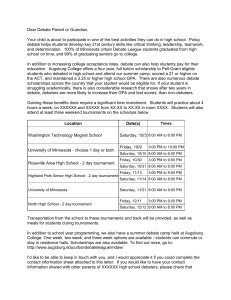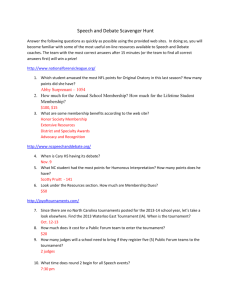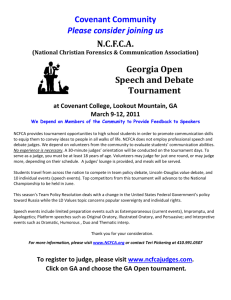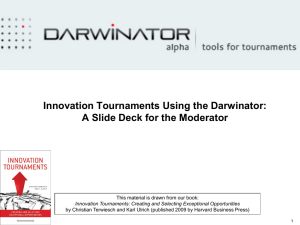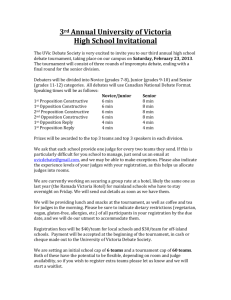here - Chicago Debate Society
advertisement
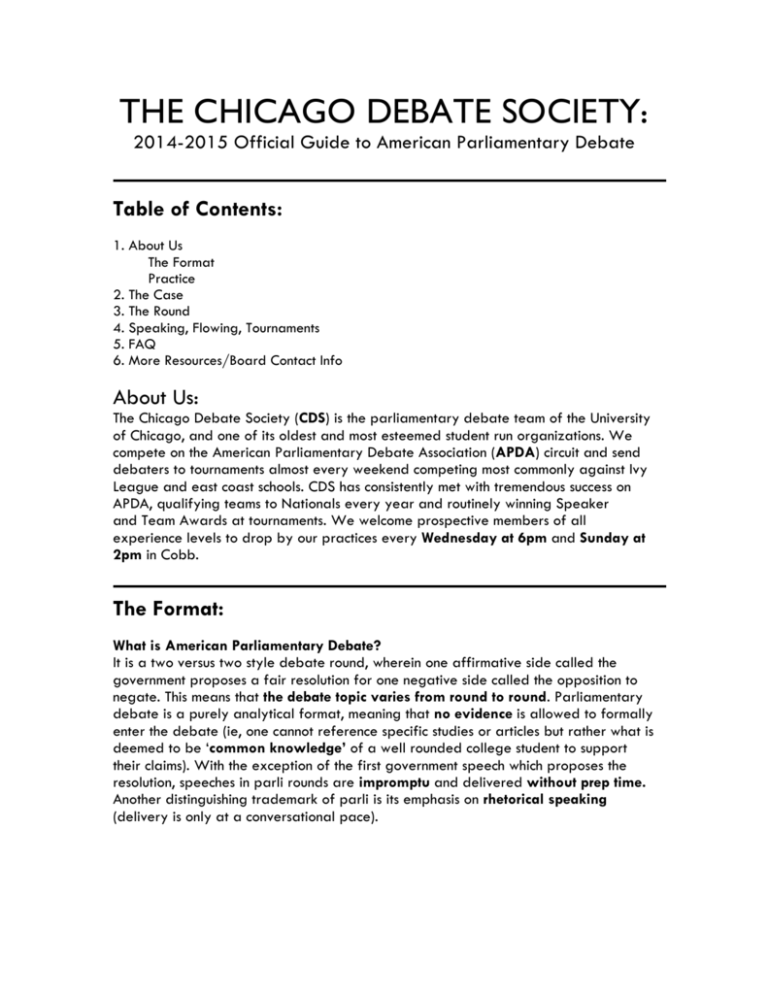
THE CHICAGO DEBATE SOCIETY: 2014-2015 Official Guide to American Parliamentary Debate Table of Contents: 1. About Us The Format Practice 2. The Case 3. The Round 4. Speaking, Flowing, Tournaments 5. FAQ 6. More Resources/Board Contact Info About Us: The Chicago Debate Society (CDS) is the parliamentary debate team of the University of Chicago, and one of its oldest and most esteemed student run organizations. We compete on the American Parliamentary Debate Association (APDA) circuit and send debaters to tournaments almost every weekend competing most commonly against Ivy League and east coast schools. CDS has consistently met with tremendous success on APDA, qualifying teams to Nationals every year and routinely winning Speaker and Team Awards at tournaments. We welcome prospective members of all experience levels to drop by our practices every Wednesday at 6pm and Sunday at 2pm in Cobb. The Format: What is American Parliamentary Debate? It is a two versus two style debate round, wherein one affirmative side called the government proposes a fair resolution for one negative side called the opposition to negate. This means that the debate topic varies from round to round. Parliamentary debate is a purely analytical format, meaning that no evidence is allowed to formally enter the debate (ie, one cannot reference specific studies or articles but rather what is deemed to be ‘common knowledge’ of a well rounded college student to support their claims). With the exception of the first government speech which proposes the resolution, speeches in parli rounds are impromptu and delivered without prep time. Another distinguishing trademark of parli is its emphasis on rhetorical speaking (delivery is only at a conversational pace). Practice Practices are Wednesdays at 6pm and Sundays at 2pm on the first floor of Cobb. Attendance is necessary for you to get better and for us to help you. Attendance is the primary consideration for debaters when the board makes tournament selections. Practices typically last for about an hour and a half, though they have no set end time. Arrive on time. Make sure your name gets on the board so that you can be paired into a round. If you have specific requests about partners, you can write yourselves up as a team, instead of an individual. The Case Basics There is no set topic in parli, rather the government team starts off each round by proposing a resolution. Picking cases makes rounds potentially great but government teams can create bad rounds with poor cases. You will learn with time what makes a good case and a bad case. The most important consideration is that if you pick an unfair or boring topic, it’s likely that you will lose, because the whole debate was your fault. Have at least four cases with you at a tournament, preferably more, since you can’t rerun them at the same tournament. Types of Resolutions Normal cases / loose-link • The government side proposes a case that changes some part of the status quo • Ex: “Japan should repeal Article 9 of its constitution” Opp-choice cases • The government side offers two potential sides for the opposition to choose from. Opp picks whichever side they want, and Gov debates the other side. • Ex: “You are a stranded spelunker. Should you eat your compatriots in order to survive?” Time-space cases • The government side picks a specific time and place with a specific situation, constraining debate to knowledge available at that time. • Ex: “You are Truman at the end of WWII. Do you bomb Hiroshima?” All cases allow Gov to specify an actor, if any. You can then restrict the judge to specific moral calculi, like “You are a brutal dictator...” Some tournaments are tight-link, which means they give everyone a list of resolutions before the round from which Gov can then choose. We send out a description of each tournament with bids, so we’ll let you know which tournaments do this. Bad Cases: Tight cases • Some things are just so obviously good or bad ideas that they’re barely debatable. APDA-tight cases are ones that no reasonable college student is likely to disagree with, like lowering the drinking age, legalizing marijuana, and gay marriage. • If Opp wants to call a case tight, they have to spend the entire time explaining why the case is not debatable, while Gov then has to prove that there do exist winnable points for Opp. Tightness becomes the sole voting issue in the round. THIS IS NO FUN. You will probably not do very well either way. • If you DO encounter a tight case, countercase, ie propose something mutually exclusive that’s also better. Status quo – Don’t propose something we already do. It isn’t fun and it isn’t allowed. Spec, or specific knowledge • If a case requires more knowledge than the average student at an average liberal arts school could be expected to have, it’s probably spec. Obviously you can explain technical things or situations that others don’t know, but when the majority of the points require highly specific knowledge of the topic, it’s a bad case. • The typical APDA standard is that a college student who reads The Economist and the front page section of the NY Times should be able to intelligently debate the topic. • This generally is not an issue, because you can ask the PM clarifying questions after case construct is announced. Plus if a case is obviously spec, the judge will not be very happy because nothing in the round will make any sense, either to you as the Opp or to them. The Round: The judge is the Speaker of the house. They call the round to order and tell you when you can speak. They also set guidelines for timing. Although all speeches have assigned times, debaters are typically allowed a thirty second grace period, plus more depending on the discretion of your judge and what round it is (if it’s 11:30PM on Friday night, for example, try not to give a 10 minute speech). Just ask your judge before the round what his/her feelings on time are. They usually tell you, anyway. Speeches All speeches are preceded by pleasantries, so say thanks to everyone for being there and make a joke or something. This does count as speech time. There is NO prep time. Speeches must be ready as soon as the previous speaker is done. Prime Minister’s Constructive (PMC) - 7 minutes • The PM introduces the case and reads the case statement. He/she then pauses the timer and allows Opp to ask a reasonable number of clarifying questions. This question period is untimed. This is also when Opp picks their side for an opp-choice case. PM then resumes time and finishes his/her speech. • Standard PMCs have three main points, often broken down into smaller subpoints. This is the only prewritten speech, so it should be as structured as possible. Leader of Opposition’s Constructive (LOC) - 8 minutes • The LO begins with three independent reasons why the case is bad/wrong. These should take up at least half of the time. Try to keep these points off-case, ie not simply responses to the PM’s points. Otherwise your entire speech will sound a bit redundant. • The LO then goes and responds to each argument in the PMC. • The LO can also introduce a countercase, which is a mutually exclusive plan that the LO can argue is superior to Gov’s proposed course of action. This can defuse debates you don’t want to have. Member of Government’s Constructive - 8 minutes • The MG responds to the LO’s points and reconstructs the Gov’s case. • It’s important to respond to everything on the flow as MG, because this is the last constructive speech for Gov before the final Prime Minister’s Rebuttal. If you drop anything significant, the MO then has 8 minutes of constructive speech time to harp on it. Member of Opposition’s Constructive - 8 minutes • This speech should introduce any new material at the top and then respond to the entire flow, focusing on the reasoning of each argument. This is the last constructive speech of the round, and thus should have a good substantive addition that wasn’t in the LO. • Too much new stuff in the MO, while allowed, is called an MO dump. This is somewhat common, but still makes some people angry. If you find yourself consistently making people very angry by giving enormous MO dumps, consider LOing. Leader of Opposition’s Rebuttal (LOR) - 4 minutes • Parli rebuttals are about impact analysis and creating a general picture of the round, and are conventionally organized around three central points. • Focus on what you’re winning. Sure there may be some points the other side is winning, but hammer in the points that you’re winning, and why they ought win you the round. • New arguments are not allowed - anything that wasn’t in the LOC or MO cannot be raised in LOR. That said, if you want to raise a disputably new point, try your best to frame it as at least tangentially related to something that’s been said. • New supporting examples are very much encouraged. Prime Minister’s Rebuttal (PMR) - 5 minutes • Same stipulations as the LOR regarding new points and examples. • The PMR can respond to new points that were in the MO but not in the LOC. These should be clearly labeled as responses to new MO points. • If the other side is giving a rebuttal and makes a new point, rise and say to the judge, “Point of Order, X argument is new.” The LO or PM then has an opportunity to respond. • The judge will tell you he’s taking it under consideration, or that he has it on the flow from an earlier speech. Only do this if the point’s actually new. • You can rise during the first four speeches if it’s not during the first or last minute. • The speaker may or may not recognize you, but if he/she does you should ask something sharp that’s detrimental to their case. • They will more often than not wave you down. It’s common courtesy to take 1-2 questions per speech, though. Decisions How judges decide • Oftentimes, based on whatever they want. • Judges should give you a reason for decision (RFD) based on what they perceived to be the more pertinent points in the round and who won them. That’s why they should be flowing extensively throughout the round. • Teams do have the right to strike judges (ensure they are not judged by them), so we’ll try to help you avoid particularly bad judges. Scores • Judges assign a winning and losing team, a rank to all debaters, and speaker points to each debater to indicate how the round went. • There are no low-point wins in parli, so if you want to win you have to learn to speak well. • Speaker points are assigned roughly from 23-28 points. Tournament packets will include their specific criteria for each score. Most tournaments center speaker points around a 25. 26 is very good. 27 is the best speech most good debaters will probably ever give. Below 23 means your speech was deeply flawed and/or offensive. Speaking Parli occurs at speeds ranging from conversational to brisk. Brisk is much slower than high school policy or fast LD and would still be completely comprehensible to most normal people. A lot of parli is based on style. The correct use of humor, sincerity and sarcasm is an art you will learn in time. Good debaters tend to either become tremendously funny or imbued with fantastic gravitas. Focus on being confident and clear, and you’ll be fine. A little courage will go a long way. Flowing For those not familiar with flowing, parli rounds are typically flowed or annotated by everyone in the room to keep track of everything. On two separate pages, one for Gov and one for Opp, each speech should occupy a column, with the responses to the speech flowed immediately to the right of the addressed arguments in the next column. Feel free to watch a varsity member do it/ask a board member if you’re confused. The Tournament: Selection: Tournament selection is based on a variety of factors, but generally our goal is to create and encourage competitive teams. Decisions are constrained by budgetary considerations and tournament policies, so even good debaters may not get their first choice of tournaments. If you at any time have a concern about not being selected, just contact a member of the officer board. As a novice, just make sure that you come to practice and learn how to debate. We will make sure that you get to travel if you put in the effort. We announce tournament schedules on the listhost so that you can request when you want to travel. This requires the ability to make plans weeks in advance (so we can buy plane tickets). Requesting a tournament means that you CAN go if we are able to send you, and that you are responsible for covering the cost of the airline ticket if you don’t go, so please check your midterms schedule before bidding. Preparation • We fly to all of our tournaments. We will send out a suggested packing list before every tournament, so there’s no need to worry about that. • Tournaments usually start on Friday afternoon and end on Saturday evening. We usually fly out Friday morning and return Sunday morning. You will spend Friday and Saturday on a dorm floor, other tournament housing, or the home of someone on the team or whom you know. Hotels are too expensive and generally inconvenient for our purposes. • Dress is anything from casual to suits, but you should look nice. • Do work in advance, as you will have unpredictable amounts of time depending on the tournament • You and your partner should have at least four cases, ideally 5-6 per tournament. Schedule • Tournaments usually run behind schedule, but the general format is three rounds and dinner on Friday, and two more rounds with breakfast and lunch on Saturday. Elimination rounds afterwards are afterwards, and we usually stay and cheer on whoever’s broken to outrounds. • Most tournaments have a party on Friday night. It’s a great way to make more friends on APDA, so going and mingling are both good ideas. Tab Stuff First rounds are paired between seeded and unseeded teams. If you are unseeded, which as novices you will be, you’ll either hit some random free seed from a random school, or some awesome varsity debaters who’ve qualified for Nats a billion times. Speak high and the subsequent brackets will treat you kindly. Reimbursements: Often times, CDS will (out of convenience) ask members to pay for something and will later reimburse them for that expense. First, never pay for a service (ie, printing, trophy engraving). Food for large events (NOT tournament meals) and certain transportation costs are reimbursable. If you pay with cash, you will need to submit an original receipt and a reimbursement request form and then deliver them to our VP of Finances. If you use a credit card, you will also need a copy of your credit card statement. Frequently Asked Questions How are speaker positions divided? Prime Minister Constructive: The first gov speaker (Prime Minister, or PM) proposes resolution (7 min) Lead of Opposition Constructive: First opp speaker constructs opp case/rebuts gov case (8 min) Member of Government: Second gov speaker (member) rebuts opp case and reconstructs gov case (8 min) Member of Opposition: Second opp speaker (member) rebuts gov arguments, reframes round (8 min) Leader of Opposition Rebuttal: First opp speaker crystallizes main voting issues in the round (4 min) Prime Minister Rebuttal: First gov speaker closes round with main gov voting issues (5 min) Total Round time: 40 Minutes Why join? Parli is an enjoyable complement to your academic experience at Chicago, hopefully providing a challenging outlet for your intellectual curiosity and inborn desire to yell at people. We also pay for your plane tickets, so you get to travel around to all kinds of colleges for free! Debating can also improve your critical thinking abilities and expose you to new ideas. Many of our alum go on to do amazing things! We have several former CDS members currently at Harvard, Stanford, and Yale Law. Others are Rhodes scholars or enrolled in grad programs in the sciences at such distinguished institutions as MIT and Penn. Also, CDS has one of the strongest RSO specific cultures on campus, with unique traditions and ties to the university that one can only experience by joining. Many members meet their best friends on the team, and the team consistently engages in social activities to promote squad culture. Do I need to have prior debate experience to join? NO. Your ability to debate well is not measured by your experience with debate. Many of our best debaters never debated before college. How do I join? First, sign up to be part of our listhost, parlidebate@lists.uchicago.edu for updates about practice, tournaments, and events on campus. Second—and most importantly—show up to practice. Your attendance and engagement with the team is the number one factor that determines which tournaments you go to and how many you go to. When is practice? Practice is twice a week: Wednesdays from 6:00 PM – 7:00 PM & Sundays from 2:00 PM – 3:00 PM. Does it cost money to be on the team? Nope. We cover travel expenses. By we—we mean UChicago. Does CDS do anything besides debate? Yes! A large portion of our activities relate to promoting discussion about relevant current events issues on campus, holding widely attended public debates on campus each quarter. We also hold a constitutional debate tournament each winter quarter, with a grand prize of $3000 open to all novices on CDS and the wider university population. Can I join CDS and not go to tournaments? Of course! You are able to decide your own level of involvement on the team. There is no minimum or maximum limit on the number of tournaments you go to, and it is all dependent on how much work you put into the activity. For More Information: Other Resources, Contact Info Visit our website: debate.uchicago.edu, or apdaweb.org. To view rounds: parlidebate.com To contact us directly, email the officer board: Jing Chai, President Emma Ashe, VP Operations Michelle Jiang, VP Finance Paul Drexler, Convener Samantha Neal, Secretary jchai@uchicago.edu emashe@uchicago.edu michellejiang@uchicago.edu pauldrexler@uchicago.edu sjneal@uchicago.edu
